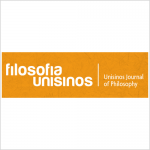New forms of expressivism: ecumenism and quasi-realism
Vol 20, No 1 (2019): Jan-Apr • Filosofia Unisinos - Unisinos Journal of Philosophy
Autor: Idia Laura Ferreira
Resumo:
For a long time, the appeal of expressivism has dominated the debate in metaethics. Normative irrealism, as represented by expressivism, exerted pressure on the debate and seemed to fence off any realistic claim. A striking trend in the contemporary discussion, however, is the emergence of theories that acknowledge a core value of truth in realist-normative views, given that expressivism failed in the attempt to meet the challenges posed by cognitivism. From Simon Blackburn’s quasi-realism to the ecumenical expressivism defended by Michael Ridge, the debate now seeks to make compatible the benefits of irrealism and the intuitively plausible account of the language and practice of morality embodied in classical normative realism, which never ceased to be the starting point of any metaethical theorizing. The present paper characterizes, draws parallels between, and confronts these two main contributions for the reinterpretation of expressivism. Although recognizing the undeniable merits of these positions, the paper aims to reveal some open questions that, unlike the intentions stated by their proponents, push these more contemporary and sophisticated views back to classical points of view that they would like to overcome.
Texto Completo: http://revistas.unisinos.br/index.php/filosofia/article/view/fsu.2019.201.09
Palavras-Chave: expressivism,quasi-realism, metaethical ecume

Filosofia Unisinos - Unisinos Journal of Philosophy
The journal Filosofia Unisinos - Unisinos Journal of Philosophy is published once every four months by Universidade do Vale do Rio dos Sinos.
Articles must be original, unpublished, and not under consideration for publication anywhere else and can be written in Portuguese, English or Spanish
Filosofia Unisinos - Unisinos Journal of Philosophy prints articles, translations and critical book reviews. It also reprints papers that are considered fundamental to the area when authorized written permission is given by the original publisher.
